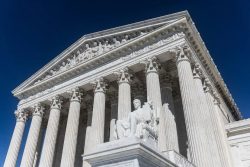 Since 9/11, the FBI has frequently used “sting” operations to capture would-be terrorists before they commit violence. Some of these efforts have been successful from the FBI’s point of view, meaning that the FBI was able to lure suspects into criminal activity under controlled conditions, before anyone got hurt. At the same time, there have been increasing complaints that the FBI is manufacturing crime rather than stopping it, and in the process, violating innocent people’s rights by intrusively investigating them without reasonable cause.
Since 9/11, the FBI has frequently used “sting” operations to capture would-be terrorists before they commit violence. Some of these efforts have been successful from the FBI’s point of view, meaning that the FBI was able to lure suspects into criminal activity under controlled conditions, before anyone got hurt. At the same time, there have been increasing complaints that the FBI is manufacturing crime rather than stopping it, and in the process, violating innocent people’s rights by intrusively investigating them without reasonable cause.
There has been some pushback about the technique from Muslim advocacy groups like CAIR, from rights groups like the ACLU, and from media. For example, HBO’s The Newburgh Sting, about a criminal case from Newburgh, New York, and PBS’s Frontline episode “In the Shadow of 9/11,” about a case in Miami, Florida, implied (not necessarily accurately) that the criminal defendants were unfairly entrapped.
Whether the FBI has exceeded permissible limits on entrapment, in effect creating crime where none would have otherwise existed, is an important question. FBI techniques, which are not new and have been used on many non-terrorism criminal suspects both before and after 9/11, may be litigated in criminal prosecutions of the Wolverine Watchmen plot to kidnap Michigan’s Governor Gretchen Whitmer. Nearly half of the people involved in the plot were FBI informants, and some defendants have alleged that they took an active and even coercive role in it. (General media and rights groups have thus far shown little interest in charges of FBI overreach and entrapment in the Wolverine cases.)
What about the inverse? What if the FBI overreaches in a would-be sting operation, but the suspects don’t fall for it? Do the people investigated have a claim against the FBI?
That’s essentially what plaintiffs assert in FBI v. Fazaga, which will be argued before the Supreme Court on November 8. It’s not an entrapment case, for plaintiffs Yassir Fazaga et al. were not criminally convicted or charged. Instead, plaintiffs claim that the FBI committed constitutional and statutory violations of their religious freedom, equal protection, and privacy rights in conducting its investigation.
Fazaga is not the first challenge raised against post-9/11 investigations. In Hassan v. City of New York, the Third Circuit reinstated a claim against New York for investigating the Muslim community after 9/11. The NYPD officers who conducted the investigation were not charged with committing illegal searches or with trying to entice plaintiffs into criminal activity, merely with attending events open to the public such as religious services. In essence, the Third Circuit opinion appears to require law enforcement to have something akin to a warrant to collect general intelligence in the form of publicly available information on members of a protected class.
The facts alleged in Fazaga are more egregious than in Hassan. Fazaga et al. claim the FBI paid an informant named Craig Monteilh, who posed as a Muslim convert and gathered personal information on hundreds of Muslims in Orange County, California, including by surreptitiously recording people in mosques, homes, and businesses. They further claim “Monteilh began expressing interest in violence,” encouraged people he surveilled to visit jihadist websites, and “told several community members that he had access to weapons and wanted to take violent action.”
The FBI has acknowledged that Monteilh was an informant, that his methods included electronic surveillance, and that it eventually lost confidence in Monteilh and stopped using him. For the most part, it hasn’t responded to the allegations. Instead, it moved for dismissal on the grounds that plaintiffs’ case could not be litigated without disclosing state secrets, by forcing the FBI to reveal its investigatory methods. The federal district court agreed and dismissed the case (all but a claim under the Foreign Intelligence Surveillance Act). The Ninth Circuit reversed, holding that the judge should first review state-secret evidence privately to determine whether the alleged surveillance was illegal.
The basic question before the Supreme Court isn’t whether Fazaga’s claims are true, but whether he and his co-plaintiffs are entitled to pursue them in court; or whether their claims are trumped by government privilege claims, meaning they’ll be thrown out. The specific issue before the Court is whether the provisions of FISA displace the state secrets privilege and thereby give plaintiffs a private right of action to challenge the allegedly unlawful surveillance. Much of the argument will doubtless be obscure and even arcane to non-experts in FISA’s statutory scheme and rules of statutory construction. Think of them as the trees in this case.
The forest is an FBI increasingly alleged to be going rogue, abusing its lawful investigatory powers and aggressively luring the unwary into committing crimes created by law enforcement, even as partisans like CAIR (one of the organizations that filed plaintiffs’ suit) seem intent on stonewalling even the most reasonable, non-invasive investigatory methods designed to cope with the very real dangers facing us, and on educating their constituents to see themselves as victims of government persecution rather than citizens motivated to help their government prevent crimes.
Here are some questions to consider that may help frame the argument’s background:
How much (alleged) abuse of investigatory authority is too much? At what point are targets of abuse entitled to pursue claims for relief against the government? Never? If abusive government agents aren’t sanctioned, what incentive do they have to discontinue their misconduct?
What limits should apply to government agents trying to protect the public against truly horrific mass murder and other crimes by rooting out potential perpetrators before they act? This isn’t the world of Minority Report, and we don’t arrest people for pre-crimes. On the other hand, do we really want agents to wait until a bomb explodes to start investigating?
Is it okay for undercover agents to collect information about people about whom the government has no particular suspicion that they’ve committed a crime? Does your answer change depending upon who’s being investigated? What if they are parents who talk loudly at school board meetings? Members of an anti-government group? How should government agents try to identify people attracted to Islamist groups? Al-Qaeda and ISIS don’t exactly publicize their meetings. Where and how should agents look for potential recruits?
Are sting operations legitimate? The Supreme Court has set some limits on entrapping defendants into crimes; do those limits need to be expanded?
Stay tuned.

